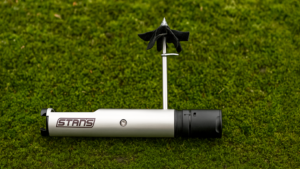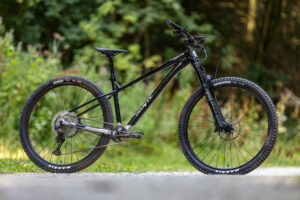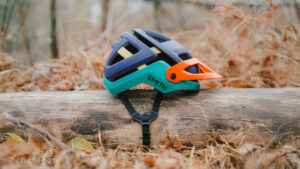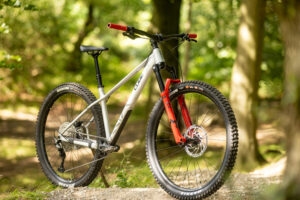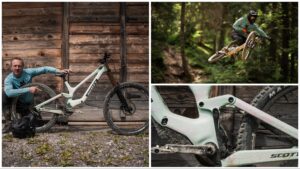Cannondale Jekyll 4 review
Benefiting from feedback from top Enduro athletes Jérôme Clementz and Mark Weir, Cannondale’s adjustable 90/150mm travel Jekyll is now in its second year of production.
Frame
The Jekyll 4’s SmartFormed alloy frame sports a huge head tube junction that houses the RockShox Sektor’s oversized 1.5in steerer. In fact, the sculpted, overbuilt aluminium chassis looks unashamedly bombproof and overall front-end stiffness gives the impression that you’re riding on a considerably beefier 36mm stanchion fork.
Out back, there’s a stubby post mount, but the rear brake still needs an adaptor. There are ISCG03 tabs on the BB shell and a tidy Syntace X-12 thru-axle to keep the rear well secured. Of the Commencal Meta AM 3, Orbea Rallon 50 and Specialized Stumpjumper FSR Comp Evo on test here, it’s the only bike for which you need an Allen key to remove the wheel, though.
Suspension
Pivotal to the Jekyll’s split personality is the custom Fox DYAD RT2 rear shock. Essentially it’s two shocks in one — a smaller air chamber for more progressivity in 90mm Elevate mode, and a larger volume air chamber with a more linear curve in 150mm Descend mode — where both ‘halves’ have their own independent damping circuits. We’d actually like to see the Descend mode run even more ‘open’ for a plusher ride.
The shock runs high pressures and requires a custom shock pump, but we found Cannondale’s guide pressures way off, so aim for 20kg below your actual weight on the set-up chart. One extra faff is that the pump Cannondale provides is very long to lug around and the small gauge means it’s tough to get accurate readings.
A Dual Position Sektor coil-sprung fork offers good performance with a supple feel and just enough damping to stop it diving too much. It’s very capable at tracking off-camber rooty stuff and while the stock spring felt fine for our 80kg testers, it obviously isn’t as adjustable as an air fork.
Components
Schwalbe’s Performance Line Hans Dampf tyres weren’t ideal during the deluge that struck during this test. And, in common with the Meta AM3, the stock SunRinglé Inferno 25 wheelset is noticeably heavy to get rolling or to climb efficiently.
Gear shifts are a tad stiff — SRAM X5/X7 shifters and mechs aren’t great, but the biggest let down is the narrow 680mm bar. We’d also like to see a chain device and dropper post at this price point.
Performance
We opted for a Medium-sized Jekyll after the Large last time out, and the reduced size does make for a more feisty and flickable machine. Jumping and pumping are well encouraged, and with the Fox DYAD shock set up really soft you can find decent grip and sensitivity. Running lower shock pressures, the aluminium chassis sits very low, which makes it fun carving tight trails, but we did clip our pedals on the ground more than normal.
This softer set up works okay on loamy trails and rooty sections, but start going fast on hard-packed, rocky trails and the shock slams through the travel and bottoms out harshly. Closer to Cannondale’s recommended settings, with the suspension set up firm, it copes silently with big impacts, but the rear end loses small bump sensitivity and the ability to track properly.
One thing that is undeniable about the Jekyll is that the chassis is super-stiff. This solidity makes the bike steer incredibly accurately, but at times makes it quite hard to get good traction on flat, slippery corners and off-camber sections. The 90mm travel setting works well for climbing and flowing sections of trail, but we sometimes struggled to flick the lever back to the ‘Descend’ mode while keeping a firm enough hold on the grip — perhaps the reason for pro rider Jérôme Clementz’s custom SRAM Grip Shift Jekyll lockout makeover.
>>> Click here to find out more about geometry with our handy guide
Verdict
The Jekyll 4 can be great fun to ride and feels super-stiff in construction. When running lots of suspension sag the bike feels nicely low slung, and rides well balanced with the coil fork, but this set-up causes a harsh bottom out on big hits.
At the heart of the design the Fox DYAD rear shock is a touch insensitive, and also difficult to set up. Our main bugbear with the £2,700 Cannondale though is that it carries a penalty that no amount of travel adjusting suspension can overcome — it’s simply too sluggish at covering ground, and quite a few of the components don’t match our expectations at this price.
MBR rating: 7
The Cannondale Jekyll 4 was tested head-to-head against the Commencal Meta AM 3, Orbea Rallon 50 and Specialized Stumpjumper FSR Comp Evo in the Summer 2012 issue of MBR.










